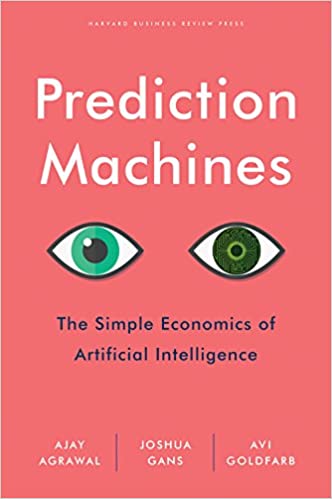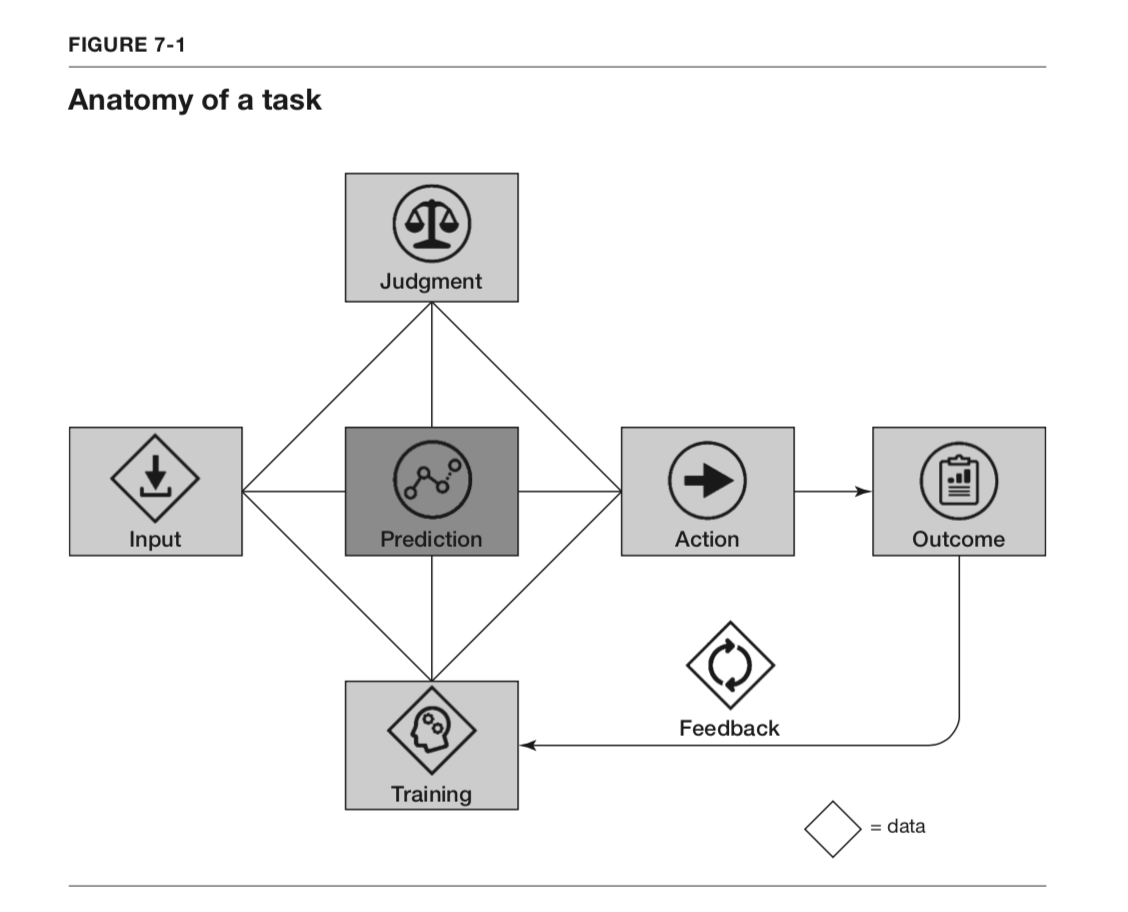
Prediction Machines
Rating: 8/10
Author: Ajay Agrawal, Avi Goldfarb and Joshua Gans Read The OriginalHigh-Level Thoughts
If you're wondering how AI will potentially affect your life, business, and every single industry in America and what you can do to prepare I recommend you read this book. The authors write the book with the preconception that the reader has no real expertise in the realm of artificial intelligence, so anyone can pick up the book and read. It's a great unintimidating way to get your feet wet in understanding the next technological revolution.
Prediction Machine Summary
"The current wave of advances in ai doesn't actually bring. us intelligence but instead a critical component of intelligence: prediction"
- Technological change makes things cheap that were once expensive.
- Computers do arithmetc and nothing more
- When prediction is cheap, there will be more prediction and more complements to prediction.
How will AI affect our business strategy?
- First, you must invest in gathering intelligence on how fast and how far the dial (capabilities) on the prediction machines will turn for your sector and applications.
- Second, you must develop a thesis about the strategic options created from turning the dial.
- Algorithms work best when structured probabilistically, based on data.
- Data is the new oil and is the key complement to prediction, however it is costly to acquire.
- From a statistical point of view, data has decreasing returns to scale, it becomes less and less useful to improving your prediction.
- From an economical point of view, data may have increasing returns to scale. For example Google has acquired much more data than bing and because of this has a much bigger market cap.
The New Division Of Labor
- As the number of dimensions for an interaction grows, human' ability to form accurate predictions diminishes. Example: Moneyball
- Prediction machines fail precisely where it is hard to predict based on the well-understood limits. in statistics.
- Compared to machines, humans are extremely good at predicting with little data, for example recognizing someone's face you saw once before from a different angle.
- Biggest weakness of prediction machines is that they sometimes provide wrong answers that they are confident are right.
- Key point: Machines don't understand the decision process that generated its choice.
- Sometimes the combination of humans and machines generate the best prediction.
Decision making
- Making a decision requires applying a judgement to a prediction before acting.
- Better, faster and cheaper prediction will give us more decisions to make.
- Uncertainty increases the cost of judging the payoffs for a given decision.
- Airport lounges and mail robots are both examples of imperfect solutions to uncertainty, and they both will be undermined by better prediction.
- Satisficing -> Thinking is difficult so people take shortcuts.
- "Automation occurs when the return to machines handling all functions is greater than the returns to including humans in the process"

Tools
- Just as the introduction of spreadsheets made bookkeepers more valuable, the redesign of a wide range of jobs due to AI tools will be equally dramatic.
- To see if AI is right for your business you need to break down your companies work flow and try to see where a prediction machine would fit in to the mix. Full automation is extremely difficult to attain, but replacing pieces of a workflow is not.
Strategy
- The costs and risks associated with AI will fall over time, so that many businesses not at the forefront of developing digital tools will adopt it.
- Another critical strategic issue is the ownership and control of data.Should you utilize others' data or own your own?
- AI will be of limited value unless you have the data to feed it.
- AI-first initiatives emphasize technical performance, and accuracy in particular. Prioritize the machine learning process even at the cost of short-term factors such as consumer satisfaction and operational performance.
- It wouldn't matter if your search results are only 80% accurate because you would ignore the bad ones however if you had an ai assistant you wouldn't want her booking a wrong reservation 20% of the time.
- AI requires learning, and startups may be more willing to invest in this learning than their more established rivals.
- Problems with AI:
- There are privacy concerns with generating user data to help make ai better.
- Not only this but companies must also keep in mind the discriminatory consequences that can happen if certain predictions are not watched closely.
- There are also security vulnerabilities that hackers can target at three different levels: input data, training and feedback. These are extremely important when it comes to predictions that contribute to a customer's well being.
- Let's say Amazon's predictions get so good that they ship you products before you order them because the algorithm knows you so well. The companies whole business model would have to change, because they would have to now focus heavily on the collecting packages that customers never wanted in the first place. However because the predictions are so good the profit will outweigh the cost of this.
Society
- Anticipate the growth in the number of jobs that involve reward function engineering.
- The key policy question isn't about whether AI will bring benefits but about how those benefits will be distributed.
- Rather than just outwardly taking your job AI might just end up creating lower and lower wages for tasks that can be automated. With the eventual termination of all human labor for that task.
- innovate investment is not a win-lose situation. American consumers are going to benefit from more investment by other countries, it is a race we can all win.
- Blockchain offers a way of decentralizing databases and lowering the cost of verifying data. Such technologies could be paired with AI to overcome privacy concerns, especially since they are already used for financial transactions, an area where issues are paramount.